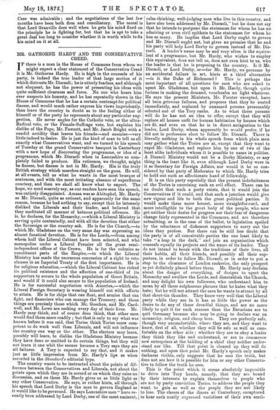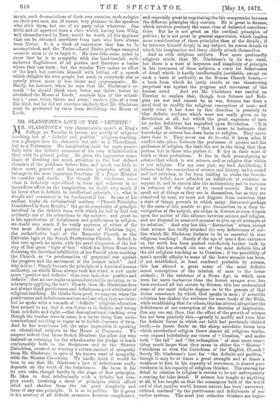MR. GATHORNE HARDY AND THE CONSERVATIVE CREED.
IF there is a man in the House of Commons from whom we I might expect a clear statement of the Conservative Creed it is Mr. Gathorne Hardy. He is high in the counsels of his party, is indeed the true leader of that large section of it which distrusts Mr. Disraeli; he is utterly fearless, and although not eloquent, he has the power of presenting his ideas with quite sufficient clearness and force. No one who hears him ever suspects his honesty, and he has repeatedly shown in the House of Commons that he has a certain contempt for political finesse, and would much rather express his views imprudently, than leave the country in doubt as to the feeling either of himself or of the party he represents about any particular sug- gestion. He never angles for the Catholic vote, or the ultra- Radical vote, or the Female-Suffrage vote, but explains his dislike of the Pope, Mr. Fawcett, and Mr. Jacob Bright with a candid acridity that leaves his friends—and enemies—very little indeed to desire. He is just the kind of man to tell us all exactly what Conservatives want, and we turned to his speech of Tuesday at the grand Conservative banquet in Canterbury with a new hope of discovering the programme, or idea of a programme, which Mr. Disraeli when in Lancashire so com- pletely failed to produce. His reticence, we thought, might be finesse, but finesse is not in Mr. Hardy. His is the truly British strategy which marches straight on the guns. He will, at all events, tell us what he wants in the most brusque of sentences, and with the most irritating absence of superfluous courtesy, and then we shall all know what to expect. The hope, we need scarcely say, as our readers have seen the speech, was entirely disappointed. Amasa was as Ahitophel, Mr. Hardy as Mr. Disraeli, quite as reticent, and apparently for the same reason, because he had nothing to say, except that he intensely disliked the Liberals and their leader, and believed that they meditated all manner of heinous political offences. He is, he declares, for the Monarchy,—which a Liberal Ministry is serving quite contentedly, and with all the devotion that either the Sovereign or the country ask. He is for the Church,—to which Mr. Gladstone on the very same day was expressing an almost fanatical devotion. He is for the Lords,—from among whom half the Liberal Cabinet have been selected, and who monopolise under a Liberal Premier all the great semi- independent offices of the Crown. He is for the colonies as constituent parts of the Empire,—to which the Liberal Ministry has made the enormous concession of a right to veto clauses in an Imperial Treaty of the first importance. He is for religious education,—which the Liberal Cabinet has risked its political existence and the affection of one-third of its supporters to secure to the whole population of Great Britain, and would if it could also secure to the population of Ireland. He is for successful negotiation with America,—which the Liberal Foreign Secretary is wearing himself out with efforts to attain. He is for ships that can float, and armies that can fight, and financiers who can manage the Treasury, and these things are precisely those which Mr. Goschen, and Mr. Card- well, and Mr. Lowe are seeking every day of their lives. Mr.
Hardy may think, and of course does think, that other men would find them more readily ; but that is only to say what was known before it was said, that Tories think Tories more com- petent to do work well than Liberals, and will not influence the country one way or the other. The electors may learn, possibly will learn, to dislike the Gladstone Ministry because they have done or omitted to do certain things, but they will not learn it one whit the sooner because a Tory says they are all failures. A Tory is expected to say that, and it makes just as little impression from Mr. Hardy's lips as when recorded in the Standard's editorial type. The country wants to be instructed about the points of dif- ference between the Conservatives and Liberals, not about the points upon which they are in accord or on which they raise no discussion, and on these Mr. Hardy gives us as little light as any other Conservative. He says, or rather hints, all through his speech that Lord Derby is the man to govern England as it would like to be governed. He says Lancashire men " have re- cently been addressed by Lord Derby, one of the most eminent, calm-thinking, well-judging men who live in this country, and have also been addressed by Mr. Disraeli," but he does not say that he intends to postpone the statesman for whom he has no admiring or even civil epithets to the statesman for whom he has so many. He implies that Lord Derby ought to govern and Mr. Disraeli ought not, but gives no promise that he and his party will help Lord Derby to govern instead of Mr. Dis- raeli. A leader's name may be and very often is the equiva- lent of a programme, but Mr. Hardy, who wishes to employ this equivalent, does not tell us, does not even hint to us, who the leader is that he is proposing to the country. Is it Mr. Disraeli, or Lord Derby, or—for Mr. Hardy, we presume by an accidental failure in art, hints at a third alternative —is it the Duke of Richmond This is perhaps the most important of all questions for men who are asked to upset Mr. Gladstone, but upon it Mr. Hardy, though quite furious in making the demand, vouchsafes no light whatever. He says the present Ministers, Mr. Forster excepted, have all been grievous failures, and proposes that they be ousted immediately, and replaced by unnamed persons presumably selected out of the Tory ranks. As to what these persons will do he has not an idea to offer, except that they will replace all houses unfit for human habitation by houses which are fit, and even on that he is in direct antagonism to the leader, Lord Derby, whom apparently he would prefer, if he did not in preference elect to follow Mr. Disraeli. There is literally nothing in his whole speech from which plain men may gather what the Tories are at, except that they want to expel Mr. Gladstone, and replace him by one of two of the least alike individuals whom it is possible to name in politics. A Disraeli Ministry would not be a Derby Ministry, or any thing in the least like it, even although Lord Derby were in it as Secretary for Foreign Affairs, nor would it be so con- sidered by that party of Moderates to which Mr. Hardy tries to hold out such an affectionate hand of fellowship.
It is on this party especially that the present indefiniteness of the Tories is exercising such an evil effect. There can be no doubt that such a party exists, that it would join the Conservatives if it could, and that such a junction would give new vigour and life to both the great political parties. It would make them more honest, more straightforward, and more intelligible to the great body of the people, who now get neither their desire for progress nor their fear of dangerous change fairly represented in the Commons, and are therefore submitting, as in the case of the ballot, to legislation spoiled by the reluctance of dishonest supporters to carry out the ideas they profess. But there can be still less doubt that the party-is of all conceivable parties the one least likely to take " a leap in the dark," and join an organisation which conceals equally its projects and the name of its leader. They do not intend to break with the traditions of their lives, all their habits, all their friends, and possibly all their sup- porters, in order to follow Mr. Disraeli, or in order to put a stop to the clearance of London rookeries, the only prospect as yet definitely placed before them. Mr. Hardy may declaim about the danger of everything, of designs to upset the Monarchy and swallow the Lords, and disestablish the Church, and may delight his own followers, who understand him to mean by all those sulphurous phrases that he hates what they hate; but he will not attract the men he wants to attract by all that sheet-tin thunder. They know very well that the Liberal party while they are in it has as little the power as the desire to do any of those dreadful things, and are no more likely to quit it for such reasons than the Bavarians are to quit Germany because she may be going to declare war on monarchy, religion, and cheap beer. They are perfectly safe, though very uncomfortable, where they are, and they want to know, first of all, whether they will be safe as well as com- fortable on the other side ; whether they are to obey a leader they think they like and understand, or are to commence new enterprises at the bidding of a chief they neither under- stand nor like. Till that point is cleared up they will do nothing, and upon that point Mr. Hardy's speech only makes darkness visible, only suggests that he sees the truth, but does not see how it is possible for him or any other Conserva- tive to follow the truth he sees.
This is the point which it seems absolutely impossible to drive into Tory heads, namely, that they are bound by their interests to explain themselves to people who are not by party conviction Tories, to address the people they want to gain as well as the people they are not likely to lose. The cheers of the diners at Canterbury, enraptured to hear such neatly expressed variations of their own senti- anents, such denunciations of their own enemies, such eulogies an their own men, are, of course, very pleasant to the speakers who elicit them, but are of no party value whatever. One little nod of approval from a class which, having been Whig, will thenceforward be Tory, would be worth all the applause that can be obtained anywhere from men who have always been Tories. It is a work of conversion that has to be accomplished, and the Tories—Lord Derby perhaps excepted —never seem to us to begin it. He does take some pains to show that he is in sympathy with the hard-headed, well- endowed Englishmen of all parties, and therefore a leader whom they can trust ; but the regular Tory makes no effort of the kind, but contents himself with letting off a speech which delights his own people, but reads to everybody else as merely abuse, more or less clever and epigrammatic. Mr. Hardy, for instance, when he says that Mr. Gladstone's re- mark " he should think once, twice, nay thrice, before he abolished the House of Lords," reminds him of the school- boy's " once, twice, thrice, and away," made a joke of a very fine kind, bat he did not convince anybody that Mr. Gladstone must be prevented by votes from abolishing the House of Lords.



































 Previous page
Previous page